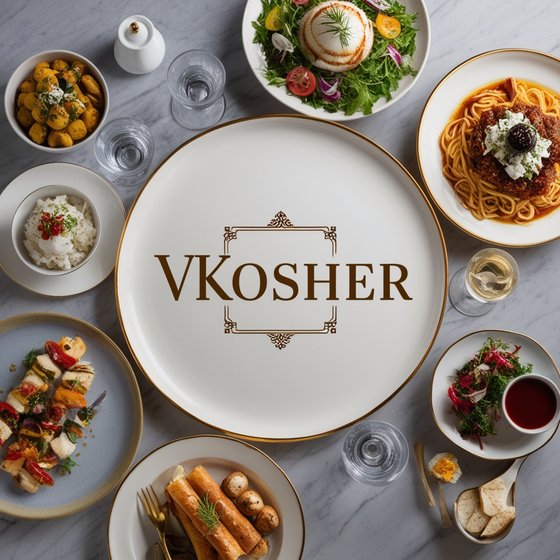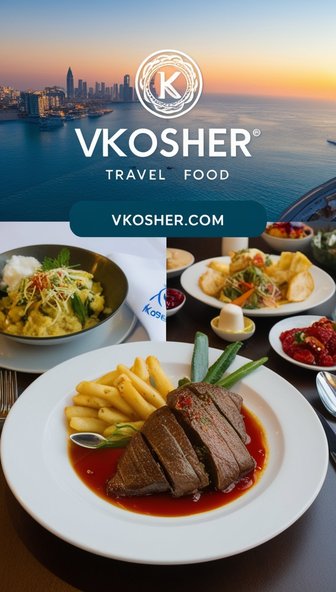Discovering Kosher Dining: A Journey Through Tradition and Taste
The Essence of Kosher Dining
Kosher dining is more than just a culinary choice; it is a reflection of deep-rooted traditions and religious observances that have been upheld for thousands of years. The term "kosher" comes from the Hebrew word "kashér," meaning "fit" or "proper." This dietary law is rooted in Jewish religious texts, primarily the Torah, which outlines specific guidelines that govern what is permissible to eat and how food should be prepared.
At its core, kosher dining encompasses a set of principles designed to ensure that the food consumed is in alignment with Jewish dietary laws. These laws, known as Kashrut, dictate everything from the types of animals that can be eaten to the methods of slaughter and the separation of meat and dairy products. For those adhering to kosher practices, these guidelines are not just about religious compliance but are also a way to foster a sense of spiritual connection and community.
The Fundamentals of Kashrut
Understanding the fundamentals of Kashrut is essential for appreciating kosher dining. The laws of Kashrut can be divided into several key categories, each with its own set of rules and regulations. The first category is the types of animals that are considered kosher. According to Jewish law, only certain animals are permitted for consumption. For example, mammals must have cloven hooves and chew their cud, such as cows and sheep. Sea creatures must have fins and scales, making fish like salmon and tuna acceptable, while shellfish are not.
The method of slaughter is another crucial aspect of kosher dining. Animals must be slaughtered in a specific manner known as "shechita," performed by a trained individual called a "shochet." This method is designed to minimize the animal's suffering and ensure that the meat is clean and fit for consumption. Additionally, all blood must be removed from the meat, which is done through a process of salting and soaking.
One of the most recognizable aspects of kosher dining is the separation of meat and dairy products. According to Kashrut, these two categories of food must not be mixed, and separate utensils and cookware must be used for each. This practice stems from a biblical commandment that forbids cooking a young goat in its mother's milk. To comply with this rule, kosher kitchens maintain strict segregation to prevent any cross-contamination.
The Experience of Kosher Dining
Kosher dining is not merely about adhering to rules; it also encompasses a rich and diverse culinary experience. Kosher cuisine reflects a variety of cultural influences, from Eastern European dishes like kugel and gefilte fish to Middle Eastern fare such as falafel and shawarma. Each community brings its own unique flavors and ingredients to the table, creating a vibrant tapestry of kosher dining options.
One of the joys of kosher dining is exploring the wide array of dishes that can be enjoyed. From hearty, comforting meals to fresh, innovative creations, kosher cuisine offers something for everyone. Traditional Jewish holidays and celebrations also feature specific kosher foods that hold symbolic meaning, such as challah bread on Shabbat or matzah during Passover. These foods not only nourish the body but also connect individuals to their heritage and traditions.
In recent years, kosher dining has also embraced modern culinary trends. Many kosher restaurants now offer gourmet dining experiences that showcase the creativity and skill of their chefs. From farm-to-table restaurants to upscale eateries, kosher dining is evolving while staying true to its principles. This fusion of tradition and innovation provides diners with exciting new ways to experience kosher cuisine.
The Role of Kosher Certification
Kosher certification is a key component of kosher dining, ensuring that food products and establishments adhere to the stringent requirements of Kashrut. Certification is typically provided by a rabbinical authority or kosher certification agency, which verifies that all aspects of production and preparation meet kosher standards.
For consumers, kosher certification provides assurance that the food they are eating is in compliance with kosher laws. Certification is often indicated by a symbol or seal on packaging, known as a "hechsher," which signifies that the product has been examined and approved by a reliable authority. This system helps maintain the integrity of kosher dining and allows individuals to make informed choices about their food.
Kosher certification also extends to various aspects of food production, including the sourcing of ingredients and the cleanliness of manufacturing facilities. The certification process involves rigorous inspections and audits to ensure that all practices align with kosher standards. This attention to detail helps uphold the trust and confidence of those who observe kosher dietary laws.
Kosher Dining in a Global Context
Kosher dining is a global phenomenon, with communities and establishments around the world embracing kosher practices. From bustling cities with diverse populations to smaller towns with tight-knit communities, kosher dining is accessible to many people, regardless of their location. This widespread presence reflects the importance of kosher dietary laws within Jewish culture and highlights the adaptability of kosher practices to different environments.
In international cities like New York, Los Angeles, and London, kosher restaurants and markets are abundant, offering a range of dining options to cater to various tastes and preferences. Additionally, many Jewish communities around the world have developed their own unique kosher cuisines, incorporating local ingredients and culinary traditions into their dishes. This global perspective on kosher dining enriches the overall experience and contributes to the diversity of kosher cuisine.
Travelers seeking kosher dining options will find that many major destinations have established kosher-friendly establishments and services. Whether visiting a city with a vibrant Jewish community or exploring a new country, kosher travelers can often find restaurants, hotels, and catering services that cater to their dietary needs. This accessibility allows individuals to maintain their kosher practices while enjoying new and exciting experiences.
The Future of Kosher Dining
As the world of dining continues to evolve, so too does the landscape of kosher cuisine. The future of kosher dining holds promising opportunities for innovation and growth. Advances in food technology, sustainability, and culinary techniques are likely to influence the development of new kosher products and dining experiences.
One area of potential growth is the incorporation of plant-based and alternative protein options into kosher menus. With increasing interest in health and environmental sustainability, many kosher establishments are exploring ways to offer vegetarian and vegan options that align with kosher principles. These innovations not only address contemporary dietary trends but also expand the range of choices available to kosher diners.
Additionally, the rise of digital technology and online platforms has transformed the way people access and enjoy kosher dining. From recipe sharing and cooking tutorials to restaurant reviews and delivery services, technology is playing a significant role in shaping the future of kosher cuisine. This digital landscape provides opportunities for greater connectivity and engagement within the kosher community.
In conclusion, kosher dining is a multifaceted experience that combines tradition, faith, and culinary artistry. By adhering to the principles of Kashrut and embracing a diverse range of flavors and influences, kosher cuisine offers a unique and enriching dining experience. As kosher dining continues to evolve and adapt, it remains a testament to the enduring legacy of Jewish culinary heritage and the ongoing journey of discovery and enjoyment within the world of food.




